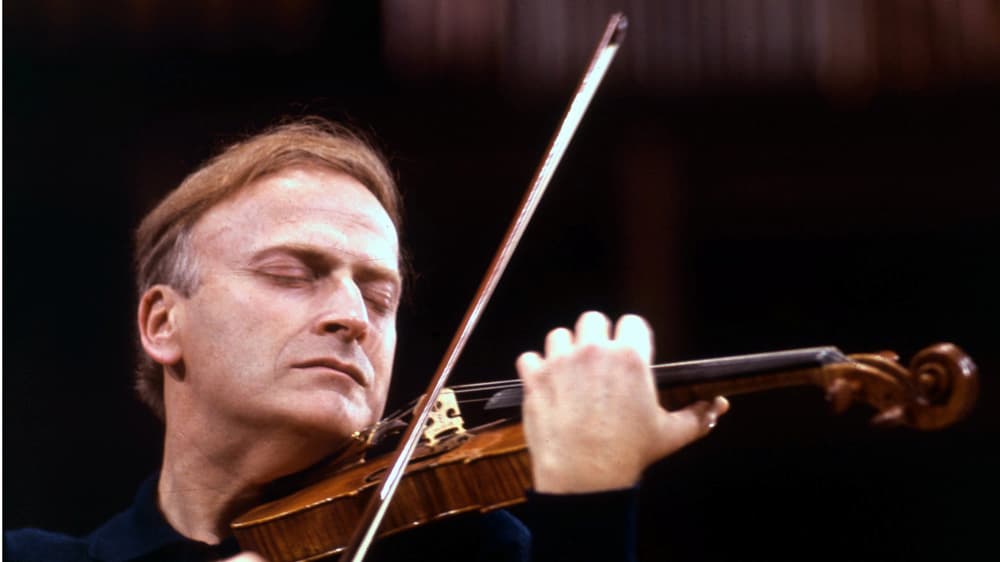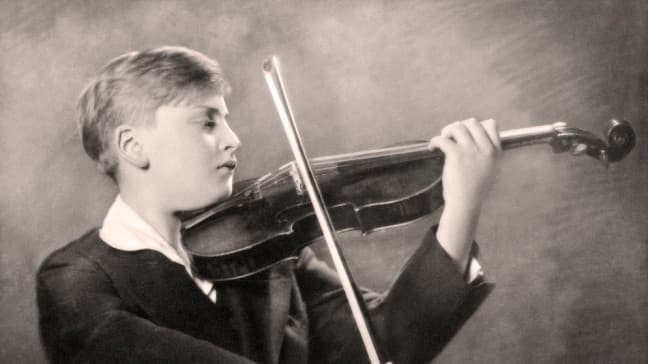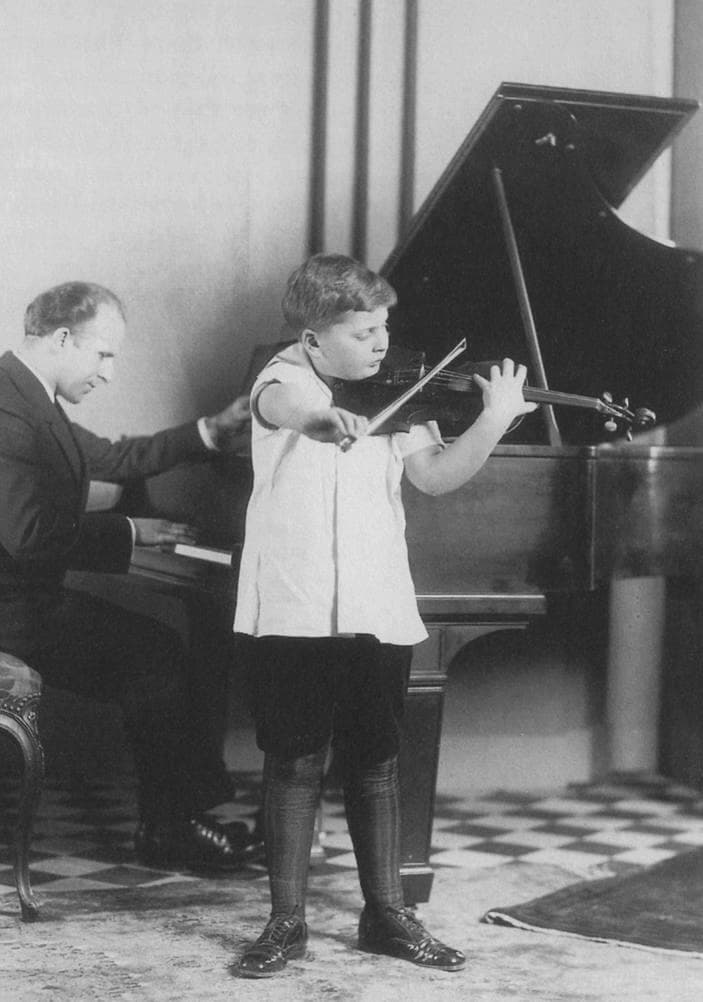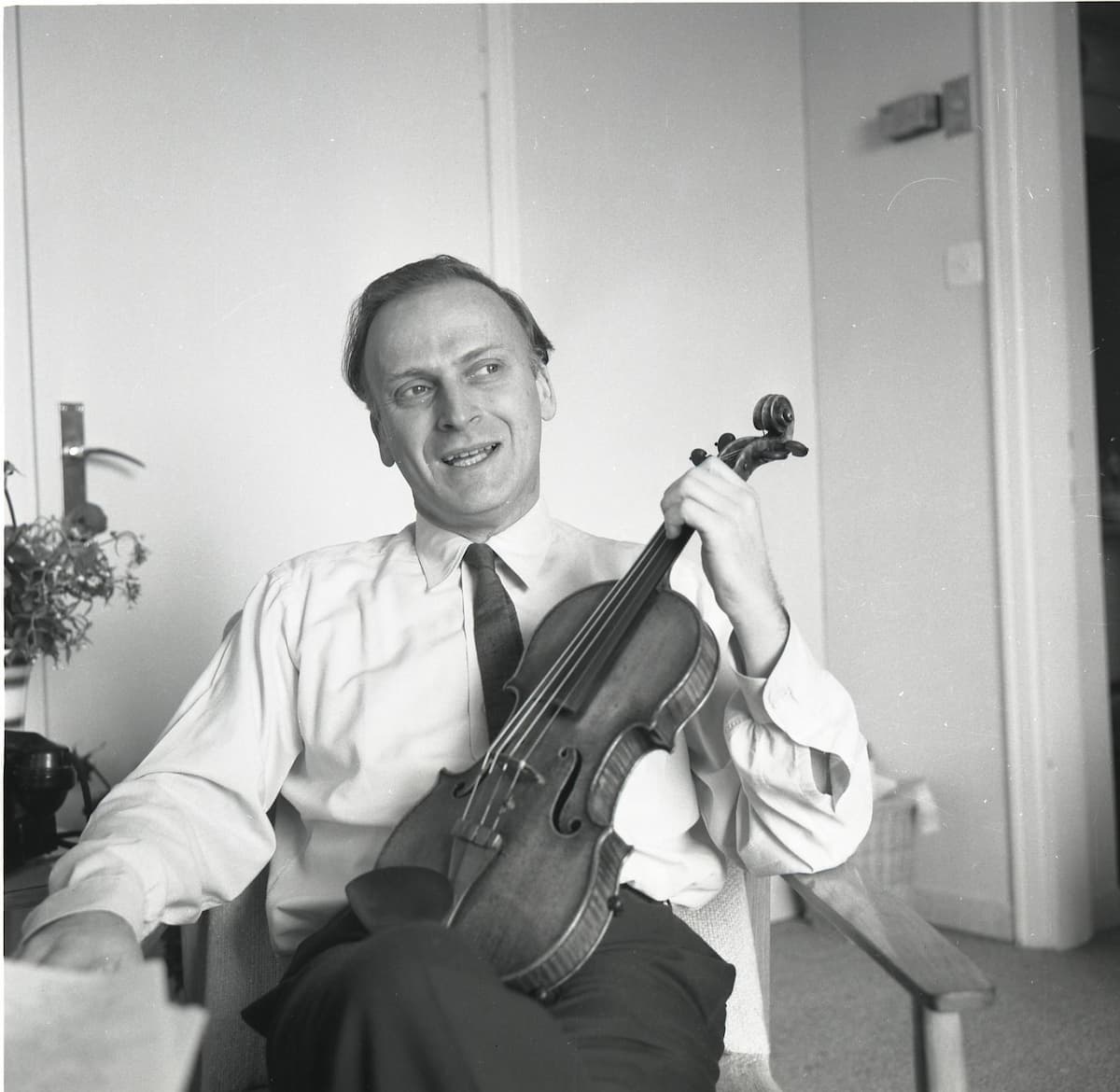One of the finest violinists and most significant artists of the 20th century, Yehudi Menuhin was a gentle spirit who gave music a profound emotional resonance. The most musically gifted violin prodigy of his generation, he devoted his life to breaking down musical barriers. As a publication wrote, “in Menuhin’s hands, the violin became a natural extension of his being, as it gave voice to his most intimate feelings and revealed his inner soul.”
Yehudi Menuhin Plays Bach’s “Chaconne”
The Family Story

Yehudi Menuhin
Yehudi Mnuchin, with the family changing the name when he was three years old, was born in New York City on 22 April 1916. However, for the first two decades of his life, all publicity material stated that he was born nine months later, on 22 January 1917. Yehudi even publicly celebrated his birthday on that day. It all turned out to be a rather clumsy subterfuge on his father’s part, as everybody was led to believe that the child prodigy was nearly a year younger than his real age.
Moshe Mnuchin was descended from a rabbinical dynasty of Lithuanian Jews. Around the age of 10, his mother put him on a boat in Odessa to live with his grandfather in Jerusalem. Yehudi’s mother, Marutha Sher, had moved to Palestine from the Black Sea town of Yalta at the age of 15, and Moshe was living in the house next door. They both found themselves in the United States, and on 7 August 1914, just days after the outbreak of WW I in Europe, the couple got married. Unable to find a foothold on the East Coast, the family packed their bags and moved to the San Francisco Bay area in California.
Felix Mendelssohn: Violin Concerto in E Minor, Op. 64, MWV O14 (Yehudi Menuhin, violin; Colonne Concerts Orchestra; George Enescu, cond.)
Unusual Gifts

It was quickly apparent that Yehudi had unusual musical gifts, with his father reporting, “as we were putting him to bed, he began to sing the words of a Hebrew lullaby, starting on the lowest note he could manage and continuing up the scale, in perfect pitch, until he reached the highest note he could hit. He paused and then began to descend the scale down, down until he reached the note on which he started. Then he fell asleep.”
When Yehudi was three, his parents took him to see the Pantages Vaudeville company. The boy was enchanted by the first professional violin recital he had ever heard, and he fell in love with the dancer Anna Pavlova. On 20 May 1920, Yehudi’s sister Hephzibah was born, and they would eventually form the finest violin and piano duos of the twentieth century. At that time Yehudi had been given a toy violin for his fourth birthday. Apparently, he smashed it to the ground, complaining that “It won’t sing! It won’t sing!”
Pablo de Sarasate: Spanish Dances, Op. 22 – No. 1 Romanza andaluza (Yehudi Menuhin, violin; Marcel Gazelle, piano)
First Lessons and Performances

Yehudi Menuhin with his teacher Louis Persinger
With his grandmother providing the funds to purchase a real violin, his parents started to look for a teacher. They approached the concertmaster of the San Francisco Symphony Orchestra Louis Persinger, but he initially turned them down without an audition. Instead, young Menuhin started lessons with Sigmund Anker, an Austrian violinist who had emigrated to California. He had a studio of at least thirty violin students, and Anker remembers, “Yehudi had already mastered several of the most difficult compositions, which could only be done by having had correct instruction.”
Yehudi went for weekly lessons, but he always maintained that he essentially taught himself by trial and error. After six months of lessons, he wrote, “for no reason I can explain, the violin began to lose its foreignness, my grip relaxed, my body discovered the freedom to forget itself, and I could enjoy what I was doing.” There are conflicting reports regarding Menuhin’s first recital, but by June 1922, on the occasion of a children’s concert, a critic writes, “The youngest was the most wonderful. He was a little fellow, so young that he did not know what fear was. His name is Yehudi Menuhin, and he plays with the prophecy of a master.”
Wolfgang Amadeus Mozart: Violin Concerto No. 5 in A Major, K. 219, “Turkish” (Yehudi Menuhin, violin; Bath Festival Orchestra; Yehudi Menuhin, cond.)
Proof of the Existence of God

Yehudi Menuhin’s visit to Israel
After two years of study under Sigmund Anker, Menuhin was finally accepted by Louis Persinger. Persinger had only recently taken up teaching, and during his first lesson he played the Adagio of the G minor Sonata by Bach for his young student. Menuhin remembered, “he played gloriously, and we both knew exactly where I wanted to go: I wanted to play like that. And that was the lesson, and we left.” Menuhin’s process was phenomenal, and he first appeared professionally in San Francisco in 1924 and gave a full-length recital the following year.
During an April 1929 performance with the Berlin Philharmonic Orchestra, playing concertos by Bach, Beethoven, and Brahms under Bruno Walter, Albert Einstein exclaimed that “such phenomenal musicality was proof of the existence of God.” And a newspaper critic wrote of this Berlin performance, “there steps a fat little blond boy on the podium, and wins at once all hearts as in an irresistibly ludicrous way, like a penguin, he alternately places one foot down, then the other. But wait: you will stop laughing when he puts his bow to the violin to play.”
For more of the best in classical music, sign up for our E-Newsletter

The author of the article On This Day 22 April: Yehudi Menuhin Was Born, omitted to mention the name of George Enescu, who taught Menuhin for many years. Yehudi Menuhin described Enescu as “the Absolute by which I judge all others… the most extraordinary human being, the greatest musician and the most formative influence I have ever experienced.”. I try to correct this omission with the short fragment below:
„He (Yehudi Menuhin) personally persuaded the great Romanian violinist and composer George Enescu to take him on as his first pupil. Yehudi was under Enescu’s spiritual and musical guidance throughout his teens. He never took a penny in fees, declaring that he learnt as much as he taught.” (Excerpt from an article that originally appeared in the April issue of BBC Music Magazine.)